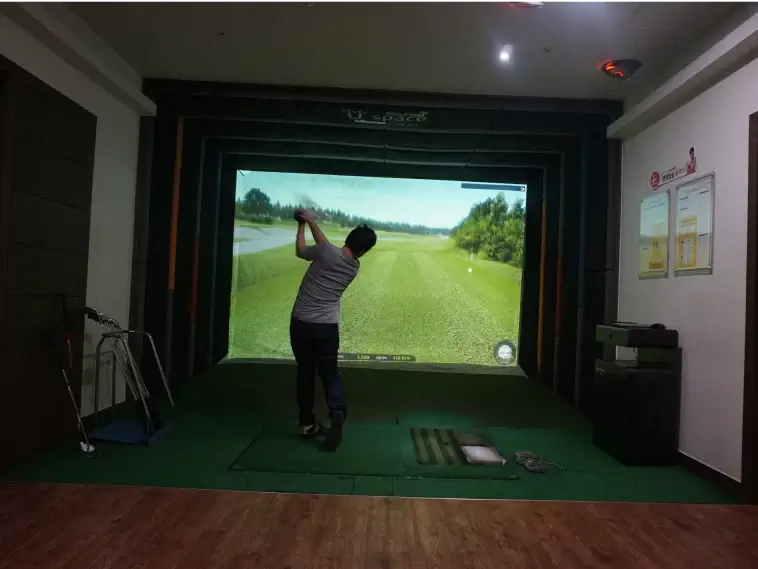The onset of the coronavirus pandemic in 2020 led to the closure of borders between countries and restricted movement throughout the world. Consequently, most major international sports events were canceled or postponed, including the Olympic Games. These measures affected sports markets adversely and deprived sports players and others in the industry of an income. This is clearly illustrated in a report on the size of losses that the sports industry bore. The expected total revenue in Korea of approximately 53,592 billion KRW in 2020 was less than 33.8% of that of the previous year (estimated to be 80,955 billion KRW). In particular, sports facilities and service providers were adversely affected as they struggled to retain their members, which, in turn, made it difficult for them to meet their expenses and eventually, some businesses had to temporarily or permanently close down.
On the contrary, despite the circumstances, the screen golf market grew substantially. The official term for screen golf was “golf simulation system,” but when it entered Korea, it changed to the expression “screen golf.” Screen golf is a system that provides an environment in which users can enjoy golf indoors by implementing golf in virtual reality. Asia Business Daily noted that this market’s sales performance increased by 38.5% in 2020 even though business hours were reduced because of the government’s social distancing measures. While approximately 1000 golf courses, equivalent to one-third of the total number, were closed down in Korea due to the coronavirus, the number of screen golf centers increased steadily until 2021, thus revealing two contradictory situations.
Screen golf was initially developed by an American golf club manufacturer and introduced in the mid-1990s. However, it failed to gain popularity. On the contrary, in Korea, screen golf has grown in popularity since the introduction of golf simulators in 2001. This increase in popularity should be viewed in conjunction with Korea’s state-of-the-art IT technologies and its unique bang culture, producing the novel term golf bang. The number of players involved in screen golf has also increased, thus generating academic attention and numerous studies on screen sport. Most studies have revealed various factors that affect participation in screen golf, specifically, reasons for participation in simulated sports, fun factors, leisure satisfaction, and customer loyalty. Moreover, screen golf’s popularity has led to an increase in deviant activities such as betting, gambling, and sports addiction, thus resulting in relevant studies. This demonstrates that screen golf is being integrated as a leisure sport in Korean society and that the value of virtual reality (VR) sports is increasing in the sports industry. It is expected that VR sports will continue to grow due to the innovation of merging virtual reality and sports in the era of the fourth industrial revolution in which we are living.
The popularity of screen golf has not lessened despite the coronavirus pandemic. Golfzon, the most prominent screen golf company, recently celebrated the opening of its 1500th location, with as many as 600 centers in the metropolitan areas of Korea. When viewed alongside 20 other brands, including SG Golf, Kakao VX, and Albatross, there appears to be a considerable number of screen golf centers. In comparison to the United States, which since its introduction to the country in 2017 has 17 screen golf centers, one may deduce its presence in Korea is spectacularly large. This large presence was confirmed when Korea’s screen golf was officially added to the International Brain-Sports Tournament’s sports program. Accordingly, screen golf has potentially received recognition as a new type of sport. Furthermore, the popularity of screen sports in Korea is expected to affect overseas sports trends.
One may ask why screen golf, which has not enjoyed popularity in other countries, has become so popular in Korea, with the largest global market.
Korea’s unique background may have contributed to such a phenomenon. The growth of a sport is a reflection of not only the era in which it takes place but also the characteristics of a country and the ethnic group that enjoys the culture from where it originates. Accordingly, it is crucial to explore the factors that impact the popularity of screen golf in Korea to determine what cultural elements, besides how the sport became popular and was accepted, have interacted with the latter factors.
Golf, which was once considered an exclusive sport that catered to certain classes in Korea, has encountered a sociocultural evolution due to its rapid increase in popularity and the creation of a new culture regarding leisure sports after being incorporated into VR. Even if this phenomenon is a temporary fad, screen golf’s popularity has considerable sociocultural significance. A close examination of this significance will shed light on the sport’s position in the current fourth industrial revolution era and predict what needs to be done for its future development.
Accordingly, the purpose of this study is to explore the popularity of screen golf, which is golf played by using an indoor golf simulator, in Korea and its sociocultural meaning.





